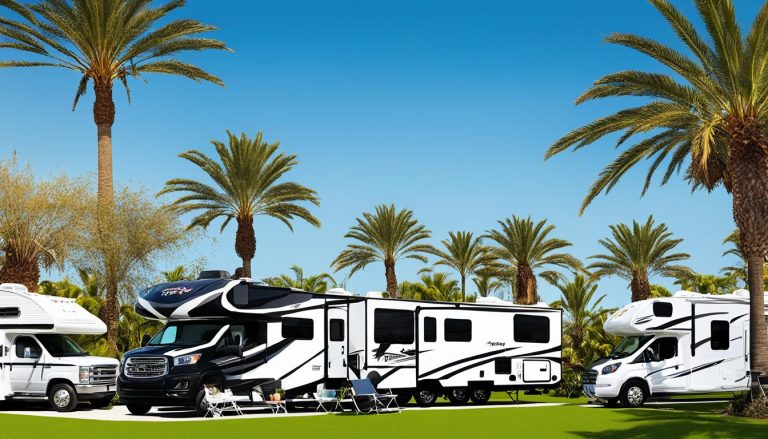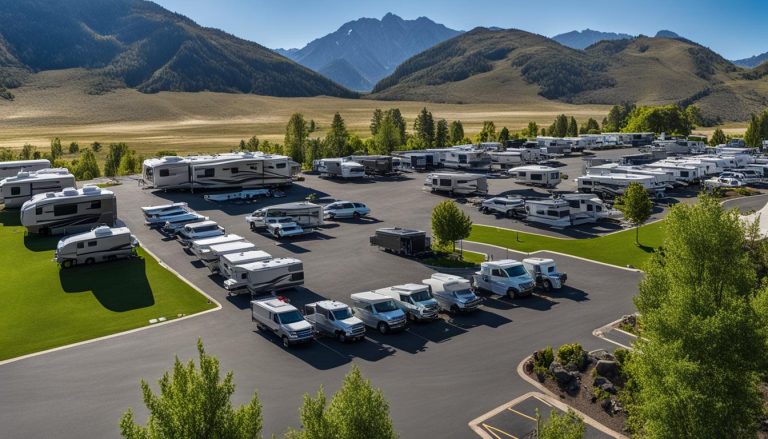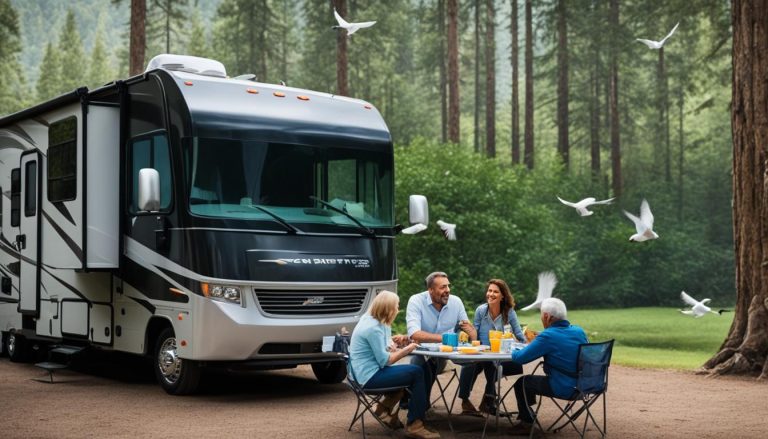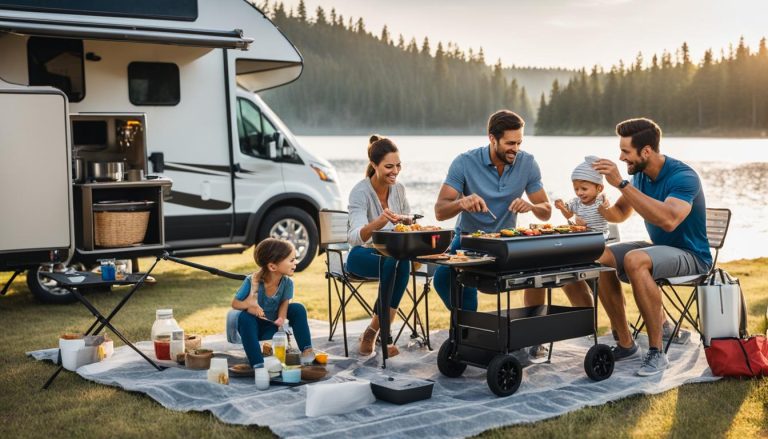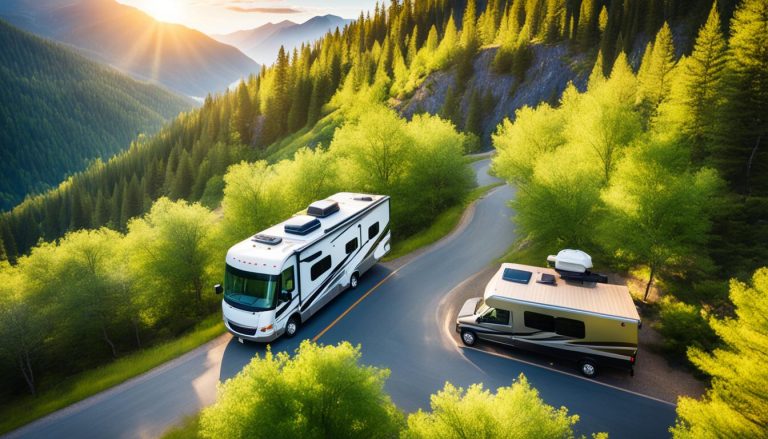Your Ultimate Guide to Purchase an RV
gorvlifestyle.com and its partners may earn a commission if you purchase a product through one of our links
Buying an RV is an exciting endeavor that allows you to embark on unforgettable adventures and create lasting memories. However, it’s crucial to approach the process with careful consideration and proper knowledge. In this comprehensive guide, we will walk you through the steps of purchasing an RV, ensuring that you make an informed decision that aligns with your travel aspirations.
Whether you are a first-time buyer or an experienced veteran of the road, this guide will provide valuable insights and tips to help you navigate the RV buying process with confidence. From choosing the right RV for your needs to budgeting, financing options, insurance, and negotiating a better price, we cover all aspects to ensure you find the perfect RV that fits your lifestyle and budget.
So, if you are ready to embark on your RVing journey and experience the freedom of the open road, let’s dive in and equip you with the knowledge and tools necessary to make your RV purchase a success!
Key Takeaways:
- Understand the different types of RVs available and choose the one that best suits your travel needs and preferences.
- Create a realistic budget that not only includes the cost of the RV but also accounts for additional expenses such as insurance, maintenance, and campground fees.
- Consider whether a new or used RV is the right choice for you, weighing the benefits of each option against your budget and preferences.
- Take into account the various expenses associated with RV ownership, such as insurance, maintenance, fuel, propane, and campground fees.
- Learn valuable tips for negotiating a better price on your RV purchase, including attending RV shows and researching available incentives.
Choosing the Right RV for Your Needs
Before purchasing an RV, it’s important to determine what type of RV will best suit your needs. Consider factors such as the purpose of your RV (e.g., family camping, full-time living), the number of people traveling with you, and the features you require.
There are various types of RVs to choose from, including:
- Motorhomes (Class A, B, C)
- Towables (travel trailers, fifth wheels)
- Specialty RVs (pop-up campers, truck campers)
Each type has its own advantages and considerations, so it’s important to research and evaluate which one will meet your needs and preferences.
Motorhomes: Class A motorhomes are large and luxurious, suitable for full-time living and long trips. Class B motorhomes, also known as camper vans, are compact and easy to maneuver. Class C motorhomes offer a balance between size and convenience.
Towables: Travel trailers are available in various sizes and floor plans, offering a range of amenities. Fifth wheels provide additional living space, often with multiple levels. Towables can be easily detached, allowing for flexibility in transportation.
Specialty RVs: Pop-up campers are lightweight and foldable, making them easy to tow and store. Truck campers are mounted on pickup trucks, providing versatility and off-road capabilities.
When choosing an RV, consider your travel goals, lifestyle preferences, and the specific features that matter most to you. Do you prioritize interior space, sleeping capacity, towing ability, or fuel efficiency? By carefully considering your needs and priorities, you can find the perfect RV that matches your travel aspirations.
Next, we’ll dive into budgeting and financing options, ensuring you have a clear understanding of the financial considerations involved in purchasing an RV.
Budgeting and Financing Your RV Purchase
Buying an RV involves careful financial planning to ensure a smooth purchasing process. In addition to the initial cost of the RV, you need to consider various expenses that come with RV ownership. By establishing a budget and exploring financing options, you can make an informed decision and avoid any financial surprises down the road.
1. Determine Your Budget
Before you begin the RV buying journey, it’s crucial to determine your budget. Consider how much you can comfortably afford to spend on an RV without stretching your finances too thin. Remember to include not only the purchase price of the RV but also other essential costs such as insurance, maintenance, fuel, and campground fees.
Creating a comprehensive budget will help you assess your financial capabilities and guide your purchasing decisions. By understanding your budgetary constraints, you can focus on RV options that fit within your financial comfort zone.
2. Explore Financing Options
If you need assistance in funding your RV purchase, there are several financing options available to you. One common option is dealership financing, where you secure a loan directly from the RV dealership. This route offers convenience and may provide promotional financing rates or incentives. However, it’s always wise to research and compare multiple lender options to ensure you’re getting the best interest rates and terms.
Another alternative is seeking third-party loans from banks, credit unions, or online lenders. These lenders often offer competitive rates and flexible loan terms. Make sure to gather and compare quotes from different lenders to find the most favorable financing option for your individual circumstances.
3. Consider Monthly Payments
When determining your RV budget, it’s crucial to consider the monthly payments associated with financing your purchase. Take into account the interest rate, loan term, and down payment to calculate your monthly installment accurately. Ensure that the monthly payments align with your budget and won’t cause financial strain.
It’s also essential to look beyond the initial purchase and financing costs. Remember to factor in ongoing expenses such as insurance, routine maintenance, repairs, fuel, and campground fees. By including these costs in your budget, you can gain a more realistic understanding of the financial commitment involved in RV ownership.
4. Complete Your RV Purchase Checklist
| Essential Steps to Buy an RV |
|---|
| 1. Determine your RV needs and preferences |
| 2. Research different RV types and models |
| 3. Visit dealerships and attend RV shows for firsthand experience |
| 4. Compare prices and negotiate for the best deal |
| 5. Conduct thorough inspections and tests |
| 6. Review and understand warranty details |
| 7. Secure financing or arrange payment |
| 8. Read and complete all necessary paperwork |
| 9. Arrange insurance coverage for your RV |
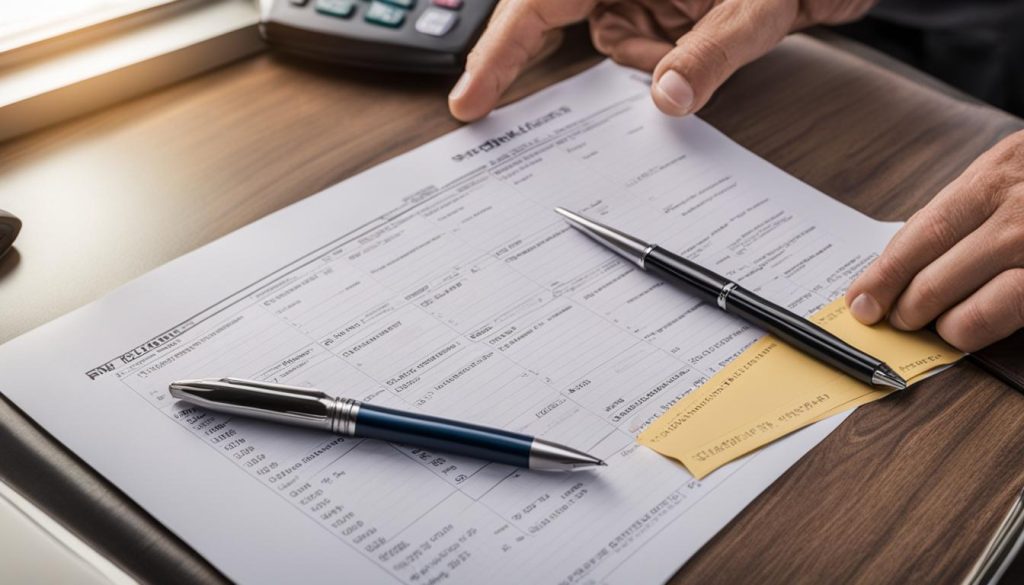
By following these essential steps, you can ensure a smooth and well-informed RV buying process. Making sure every step is checked off your checklist will help you avoid potential pitfalls and navigate through the purchase process with confidence.
By budgeting effectively and exploring your financing options, you can embark on your RV adventure without worrying about financial strain.
New vs. Used: Which RV is Right for You?
When it comes to buying an RV, one of the key decisions you’ll need to make is whether to go for a new or used vehicle. Each option has its own set of advantages and considerations, so let’s take a closer look at the factors to consider before making your choice.
The Benefits of Buying a New RV
Buying a brand-new RV can be an exciting prospect. Here are some of the benefits:
- Latest Features: New RVs come equipped with the latest technology, amenities, and design features, ensuring a comfortable and modern RVing experience.
- Customization Options: You have the freedom to choose the floor plan, decor, and additional features that best suit your preferences and needs.
- Manufacturer Warranties: New RVs typically come with full manufacturer warranties that provide coverage for potential issues, giving you peace of mind.
While new RVs offer these advantages, it’s important to consider the potential drawbacks as well.
The Appeal of Buying a Used RV
Purchasing a used RV can also be a viable option for many RV enthusiasts. Here’s why:
- Affordability: Used RVs generally come at a lower price point compared to new ones, making them more accessible for budget-conscious buyers.
- Great Value: Despite being pre-owned, many used RVs are still in excellent condition and can provide a fantastic RVing experience for a fraction of the cost.
- Opportunity for Savings: With a used RV, you have the potential to save money upfront and allocate those savings towards other travel expenses or future adventures.
However, it’s important to keep in mind that used RVs may have their own set of considerations:
- Maintenance and Repairs: Depending on the age and condition of the used RV, you may need to allocate extra funds for maintenance and repairs.
- Potential Renovations: If you’re open to undertaking renovation projects, a used RV can offer a blank canvas for customization and personalization.
Remember, whether you choose to buy new or used, it’s essential to inspect the RV thoroughly, review its maintenance history, and take it for a test drive before making your final decision.
Ultimately, deciding between a new or used RV depends on your individual preferences, budget, and willingness to take on potential renovation projects. Consider these factors carefully to find the RV that suits your needs and sets you on the path to unforgettable adventures.
| New RV | Used RV |
|---|---|
| Includes the latest features and technology | More affordable upfront cost |
| Customizable to your preferences | Potential for extra maintenance and repairs |
| Full manufacturer warranties for peace of mind | Opportunity to save money upfront |
As you can see, both new and used RVs offer their own unique advantages. Consider your priorities, budget, and long-term goals to help you make the right decision.
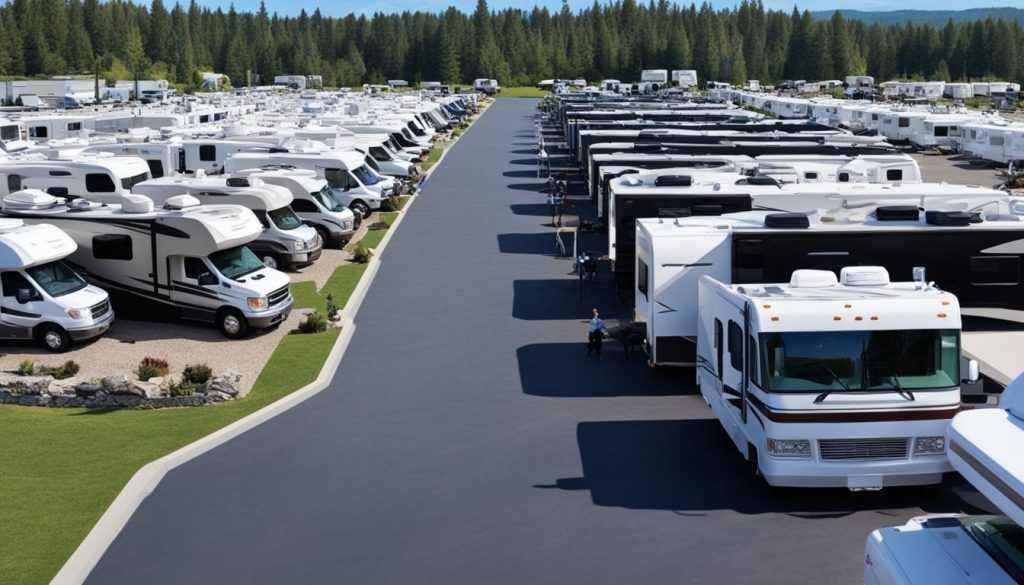
Insurance and Additional Expenses for RV Ownership
When buying an RV, it’s important to consider not only the initial purchase cost but also the ongoing expenses associated with ownership. RV insurance is a crucial investment to protect your valuable asset. Rates for RV insurance can vary based on factors such as the type of RV, its usage, and your driving record. It’s essential to research different insurers and coverage options to find the best policy that meets your needs.
Aside from insurance, there are other expenses to account for when budgeting for RV ownership. These include regular maintenance and repair costs, registration fees, fuel, propane, and campground fees. It’s essential to allocate a portion of your budget to cover these expenses, ensuring a smooth and enjoyable RV ownership experience.
For a comprehensive breakdown of the expenses associated with RV ownership, refer to the table below:
| Expense | Estimated Cost |
|---|---|
| RV Insurance | Varies (depending on factors such as RV type, usage, and driving record) |
| Maintenance and repairs | $1,000 – $2,000 per year |
| Registration fees | $50 – $300 per year |
| Fuel | $0.10 – $0.15 per mile |
| Propane | $2.50 – $4.00 per gallon |
| Campground fees | $20 – $60 per night |
It’s important to note that these estimates can vary depending on individual circumstances such as RV usage, lifestyle choices, and personal preferences.
RV Insurance Tips:
- Shop around: Get quotes from multiple insurance providers to compare coverage and rates.
- Consider bundling: Some insurance companies offer discounts if you bundle your RV insurance with your existing auto or homeowners’ insurance.
- Ask for discounts: Inquire about available discounts such as safe driver discounts, full-time RVing discounts, or affiliation discounts with certain organizations.
- Review coverage regularly: As your RV and lifestyle change, make sure your insurance coverage continues to meet your needs.
Remember, RV ownership is not just about the initial purchase but also the ongoing costs. By budgeting for insurance and other expenses, you’ll be well-prepared for the financial aspects of owning an RV.
Tips for Negotiating a Better Price on an RV
When buying an RV, it’s important to be a savvy negotiator to get the best deal. Consider these tips to help you negotiate a better price on your RV purchase:
- Attend RV shows or shop at the end of the RV season or month when dealers may offer discounts.
- Leave your options open and explore different dealerships and sellers to compare prices and leverage competition.
- Be patient and don’t rush into a purchase. Take your time to research and find the best deal.
- Take risks and negotiate confidently. Don’t be afraid to ask for a lower price or additional accessories or services to be included.
- Research available incentives and financing options. Some manufacturers and dealerships offer rebates, incentives, or special financing rates that can make the price tag more worthwhile.
- Consider buying a used RV. Used RVs can often be purchased at a lower price, and with a thorough inspection, you can still get a high-quality RV.
By following these tips, you can potentially save money on your RV purchase and get the best value for your investment.
Final Considerations Before Purchasing an RV
Before you make the final decision to buy an RV, there are a few important factors you should consider. First and foremost, think about the destinations you plan to travel to with your RV. Different locations may have specific requirements or considerations that you need to be aware of. Whether it’s national parks, campgrounds, or specific states, understanding any restrictions or regulations will help you make an informed choice.
Next, determine how you intend to use your RV and what features are essential to you. Are you planning to go on weekend camping trips with your family, or do you want to embark on an extended cross-country adventure? Consider the size, amenities, and layout that will best suit your needs and provide the level of comfort and functionality you desire.
It’s also crucial to take the time to research code requirements and safety standards. Ensuring that your RV meets all necessary regulations will not only give you peace of mind but also keep you and your loved ones safe on the road. Look into aspects such as electrical systems, plumbing, fire safety measures, and weight limits to make sure your RV is compliant.
By carefully considering these final factors, you’ll be equipped to make a well-informed decision when purchasing an RV. Remember to incorporate the insights and knowledge you’ve gained from this comprehensive RV buying guide into your decision-making process. With the right research and evaluation, you can confidently embark on your RV adventure and create lasting memories on the open road.
FAQ
How do I determine which type of RV is right for me?
Consider factors such as the purpose of your RV, the number of people traveling with you, and the features you require. Research the various types of RVs available, including motorhomes, towables, and specialty RVs, to determine which one best suits your needs and preferences.
What should I include in my RV budget?
In addition to the cost of the RV, you should also consider expenses such as insurance, maintenance, fuel, and campground fees. Determine how much you can comfortably afford and factor in these additional costs to ensure a smooth RV ownership experience.
Should I buy a new or used RV?
It depends on your budget, preferences, and willingness to take on potential renovation projects. New RVs offer the latest features and full manufacturer warranties but can be more expensive. Used RVs are more affordable and can still provide a great RVing experience, but they may require more maintenance and repairs.
What other expenses should I consider when buying an RV?
Other expenses to consider include RV insurance, maintenance and repair costs, registration fees, fuel, propane, and campground fees. Make sure to account for these expenses in your budget to avoid any financial surprises.
How can I negotiate a better price on an RV?
Consider attending RV shows or shopping at the end of the RV season when dealers may offer discounts. Leave your options open, be patient, and take risks when negotiating. Research available incentives and financing options to make the price tag more worthwhile.
What should I consider before finalizing my RV purchase?
Think about where you plan to travel with your RV, how you will use it, and what features are essential to you. Research code requirements and safety standards to ensure your RV meets all necessary regulations. By considering these factors, you can make a well-informed decision and enjoy your RV adventure with peace of mind.

